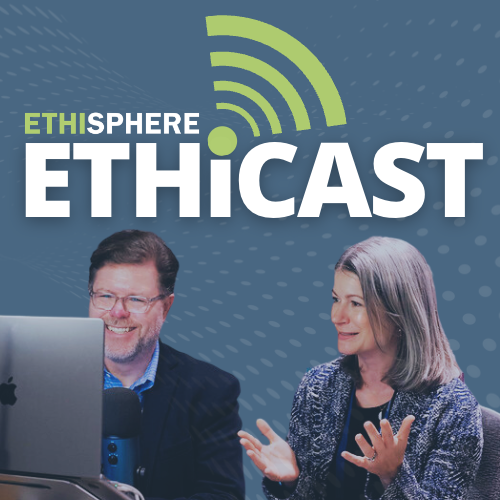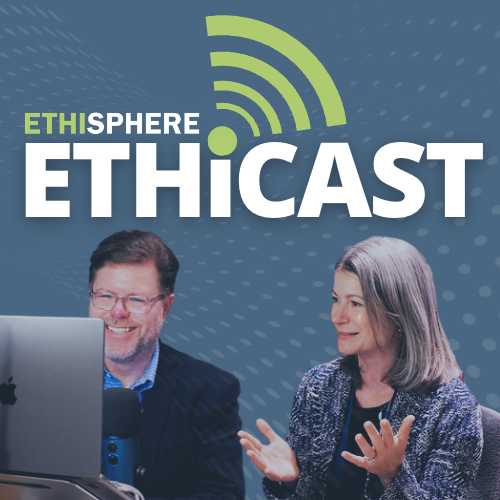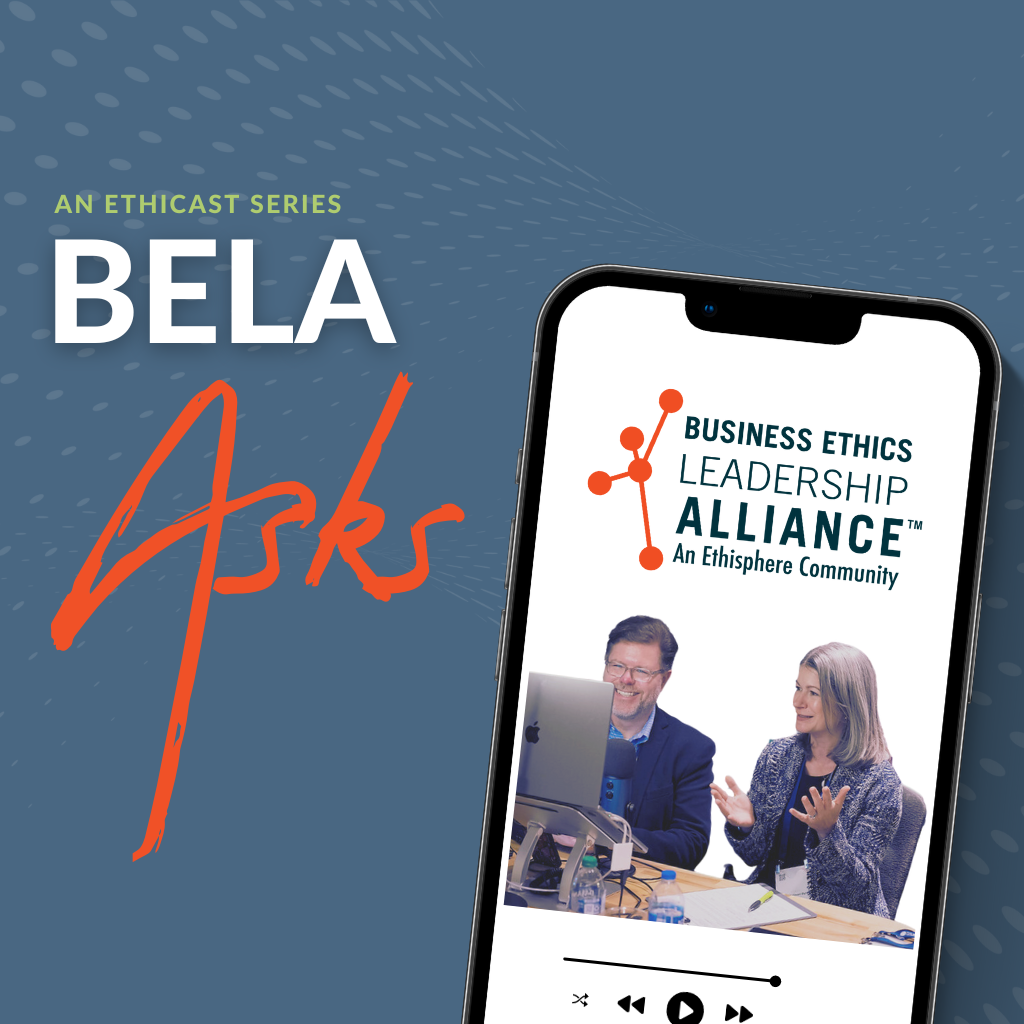[00:00:00] Speaker A: Hi, everyone. The Business Ethics Leadership alliance has questions and we have answers. I'm your host, Bill Coffin. Welcome to another Bella Asks episode of the Ethicast.
One of the best benefits of being a member of the Business Ethics Leadership alliance or bella, is that if you have any questions at all about ethics and compliance, you can submit them to Bella's concierge service and one of our internal experts will provide an answer and direct you to a helpful resource for more information.
Many of these requests speak to broad challenges facing Bella members and by extension, the wider ethics and compliance profession. That's why we're using this show to thematically respond to high level questions from the Bella community. Joining us once again to answer those questions is Bella chair Erica Salmon Byrne. Erica, thank you for returning to the program.
[00:00:56] Speaker B: Oh, absolutely, Bill. I'm delighted to be back and I think today we're going to talk about one of my favorite topics.
[00:01:01] Speaker A: Indeed. This next question is a training question and it reads, what is a good completion rate? I hear this all the time.
[00:01:09] Speaker B: Yep. So it's, it's an interesting question, Bill, because what it says to me is that this particular Bella member is somebody who is struggling with getting their employee base to complete the assigned training that the compliance team or the HR team or whomever has asked them to take. And so not to answer a question with a question, but I have a couple questions for this particular Bella member. On this one, the first question is, are you the only person rolling training out in the business that has this problem? So that will take you down. Depending on whether your answer to that is yes or no, it'll take you down one path or the other. If yes, you're the only person that has an issue with this, this, you know, with people not being willing to or quick to take your training, then you need to ask yourself, why, right? Am I over assigning training? Have I made the training window too short or too long?
You know, do people not understand why I'm asking them to take the course that I've asked them to take? That's a, that's a big one. We hear that a lot from employees. They're like, I don't work with overseas, you know, vendors, like, why do I have to take AML training if it's not? If you cannot explain to the employee the purpose of the training that you've asked them to take, then you're going to struggle getting them to take the training. So if you're, yes, right, you're the only one with this issue, then you kind of go down one path. If you're no, everybody struggles with this issue. Well, now that's a different question. Right. Then you need to ask a larger cultural question. You need to look at, do we not have the right incentives in place to make sure that people complete their training on time? Do I not have enough stature, actual or perceived across the organization to be able to get people to take the training? And are my friends in HR and it finding themselves in a similar position? Right. If that's the case, then your fix is going to be much more of a senior leadership weigh in to make sure that people understand that the training is not optional. Right. This is something we are, we are giving you information that is going to allow you to do your job the way we need you to do your job. And therefore we need you to, you know, to engage with this content. So that's the first piece. You know what, what, what's driving the fact that people are not taking their training with the right level of alacrity? If you have done your training planning properly and you've assigned the right topics to the right people for the right risks, right. Then your completion rate should be awful close to 100%.
Taking into consideration family leave, medical leave, you know, service leave, right. You're, you're going to have employees during your training window that are going to have a very legitimate reason why they haven't taken the training.
But if you have a situation where you know, you've assigned your training well, then you should have everybody who is able to access that training link during the training window completing the training because you've assigned it for a good reason and you've assigned it because you think this is risk information they need. So if you're really struggling to get north of 85% or 88% or 89% on your training, you need to step back and ask yourself, why are people dragging their heels on taking this?
And hopefully you can address that reluctance to take the training with a better link into the work that they do. As opposed to some of the punitive measures that we see companies ending up having to resort to. Like, okay, fine, you're not going to take your training. I'm going to shut off your access to your computer right when nobody wants to get there. Because then basically you've just come in with this, you know, cartoon sized baseball bat and hit somebody over the head. And then in that particular circumstance, the likelihood that they're going to engage with any of your content just went to zero. So as you and I have talked about on Prior Bella asks Bill and this particular question and this topic fold in really nicely to the thread of training related content we've answered on this show. It all starts with your training plan, right? It all starts with looking at who else is doing training. How do I fit into their schedule? How do I make sure I'm not duplicating what somebody else is doing? How do I make sure I'm not rolling my training out at the same time as it does phishing training? Right? Like how do I coordinate this so that the employee who is the audience for your content feels like they have been heard, they have been seen, and they have been given something useful? If you hit the mark on that, you're not going to have an issue with your completion rate.
[00:05:45] Speaker A: Well, Erica, I learned something new every time you come on the show. Thank you once again for another terrific answer, another meaningful question.
[00:05:52] Speaker B: Absolutely, Belle. My pleasure. And to all those Bella members listening out there, keep the questions coming and Bella and I will come back and answer more.
[00:06:01] Speaker A: To learn more about Bella, please visit ethesphere.com Bella to request guest access to the Member Resource Hub and to speak with the Bella Engagement Director. And if you have a question that you would like answered on Bella Asks, be sure to use the Bella Concierge Service and we'll get to your question just as soon as we can. Bill I'm Bill Coffin and this has been a special Bella Asks episode of the Ethicast. For more episodes, please Visit the Ethisphere YouTube
[email protected] ethisphere and if this is your first time enjoying the show, please make sure to like and subscribe on YouTube, Apple Podcasts or Spotify. Thanks for joining us once again and until next time, remember, strong ethics is good business.


